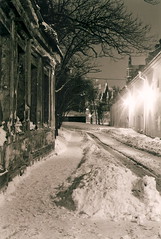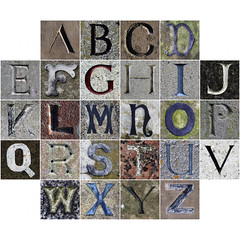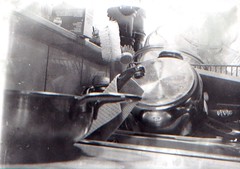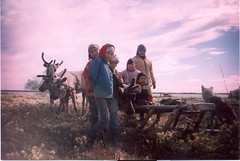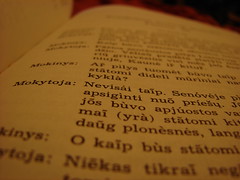I keep going back to that month I spent at the Banff Centre for the Arts almost four years ago. Never before had I been treated with such generosity and respect (one of the Literary Journalism program’s mentors jokingly warned us not to get used to it, since never again would we be treated this well). The resources were humbling: everything to foster creativity and work was provided. So when I couldn’t deliver the quality of text I’d set out to write during my tenure there, I felt deep humiliation.
But my failure at Banff ended up teaching me about what kind of writer I am. What’s more, that failed text has finally (finally!) transformed itself into something good.
I travelled to Alberta in the summer of 2006 to write a 10,000 word essay on a librarian who hid Jews in a Lithuanian university library during the Shoah. I had my story, my archival documents to cite, and my ideas about what form it should take: above all, I wanted to keep myself out of the essay and avoid using the first-person voice.
Since I had written my first book in a quirky first-person, I was determined to try something new. I wanted to write something “straight”: to tell a story that deserved to be told without mucking it up with theatrics or by inserting myself into the narrative. It seemed like a good plan, and I stuck to it. At the end of four weeks of painful essay extraction, I submitted my final product.
The essay was a disaster. Clunky and lifeless. Even I had to admit it, so once I came home, I kept working on it, wrestling with it and trying to diagnose the problem.
Only after hundreds of drafts over many months, and a grudging return to the first-person voice, did the text begin to work. The story found its traction and my central character (the librarian) gained colour.
Why? What is it about the first-person voice that is so powerful? And why are we so suspicious of it?
Years ago, I was thinking about pitching something to the Chicago Public Radio show This American Life, and looked at their website for guidelines. One line from their description of what makes a good story has stayed with me. It’s now gone from the site, but it went something like: “We look for stories that appear to be about one thing, but that are actually about another.”
This is what the first-person voice is best at.
It’s easy to sneer at the glut of memoirs of the past decade, and to discredit the genre as somehow dishonest or narcissistic, but autobiographical texts and personal essays that really work are always about something bigger than the person writing them.
The best first-person texts flirt with navel-gazing, but are redeemed by insight, artistry, self-criticism, and honesty. By telling a story about their own singular lives, skilled autobiographers and personal essayists inspire revelations. In other words, these texts not only reveal something about the person writing them, but also about the one reading them.
My Banff essay didn’t work when it was just about my librarian, and began to gel only when I found the something else it was really about. Ultimately, the essay came to tell a love story between a researcher and her subject, and the ways in which a pregnancy disrupts this imagined relationship. This story that appeared to be about a Holocaust rescuer was actually about writing and motherhood.
After more rejections than I care to admit to, the essay (now called “Pregnant Pause: On Ona Šimaitė, Research, Writing and Motherhood”) has found its home in a journal called Feminist Formations, formerly the National Women’s Studies Journal. It will appear very soon, in a matter of weeks. I’ll let you know when it happens.
If you’re interested in thinking more deeply about the first-person voice, or simply in reading some top-notch texts, take a look at Phillip Lopate’s edited volume, The Art of the Personal Essay. It’s a massive, brick-sized tome, and will keep you inspired and interested for years to come.
[Photo: DelosJ]



